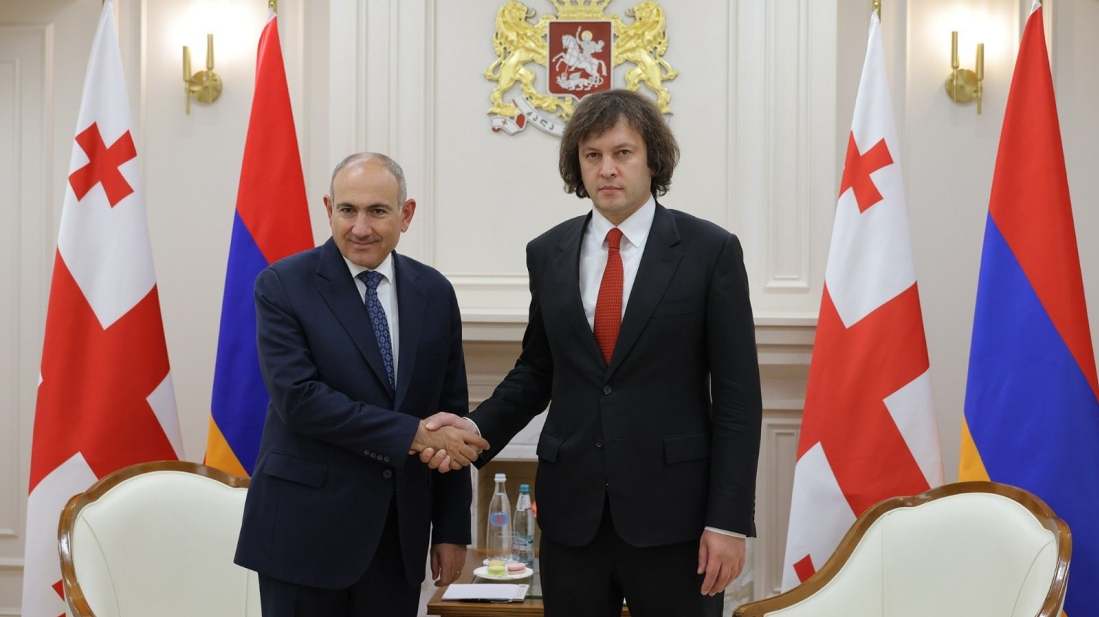Trump says he will raise global tariff rate from 10% to 15%
President Donald Trump said on Saturday (21 February) that he will raise temporary tariffs on nearly all U.S. imports from 10% to 15%, the maximum all...

The Georgian Defence Minister Irakli Chikovani was in Yerevan, Armenia on Monday for an official visit following an invitation by his Armenian counterpart Suren Papikyan.
At first glance, the meeting appears to be a standard diplomatic exchange. Yet, in today’s South Caucasus where every gesture between neighbours is weighed for political meaning, it reflects the careful balancing underway across the region.
Georgia and Armenia approach this visit from very different but equally uncertain security contexts.
For Georgia, Russian forces remain entrenched in Abkhazia and South Ossetia — a constant reminder that its sovereignty is incomplete and its defence posture constrained.
For Armenia, the aftermath of the 2020 war with Azerbaijan and the fall of Nagorno-Karabakh have left deep political and strategic scars.
Moscow’s declining influence and perceived failure to support Yerevan during critical moments have pushed Armenia to explore new partnerships.
Within this shifting landscape, even a formal, pre-announced defence visit carries symbolic weight.
Both capitals appear intent on keeping communication open while navigating complex relations with Russia, Azerbaijan, Türkiye, and the West.
For Tbilisi, engaging with Armenia fits into a consistent pattern of cautious regional diplomacy.
It allows Georgia to project itself as a constructive and independent player — maintaining stability on its borders while avoiding entanglement in the Armenia–Azerbaijan rivalry.
The visit also helps reaffirm that Georgia’s security outlook is not defined solely by the West or by Russia but shaped by practical cooperation with its immediate neighbours.
Still, Tbilisi remains careful not to appear as taking sides. The tone of the visit was deliberately moderate, focusing on dialogue and partnership rather than new agreements or joint initiatives.
For Armenia, the visit reflects a deliberate shift toward diversification. Since 2020, Yerevan has faced the erosion of Russian credibility as its main security guarantor under the Collective Security Treaty Organization (CSTO).
Armenia has been widening engagement with the European Union, the United States, and NATO member states — while remaining formally part of Moscow-led structures it now openly questions.
Closer coordination with Georgia, a country balancing its own complex relations with Russia, offers Yerevan a way to strengthen regional links without direct confrontation.
Track Record of Gradual Cooperation
This meeting continues a pattern of gradually intensifying defence contacts between the two countries:
While these steps remain largely technical, they have institutionalized communication between the two defence ministries a notable shift compared to the limited engagement of previous years.
The wider regional backdrop remains decisive.
Azerbaijan, now in a position of dominance after regaining full control of Nagorno-Karabakh, continues to strengthen its alliance with Türkiye.
Relations with Moscow, however, have grown more cautious. During the recent summit in Dushanbe, President Ilham Aliyev notably avoided a diplomatic handshake with Vladimir Putin — a small gesture that underscored the coolness in what has often been described as a pragmatic, transactional partnership.
Russia’s influence across the South Caucasus has weakened, yet it still retains leverage through energy routes, border deployments, and the inertia of old alliances.
For now, the Yerevan meeting remains within the bounds of protocol — a sign of dialogue, not a declaration of new strategy.
No new defence agreements were announced, and both sides avoided language that might signal a shift in alignment.
In a region where every diplomatic gesture is scrutinized, the Chikovani–Papikyan meeting stands as a reminder that South Caucasian diplomacy is no longer about grand alliances — but about small, deliberate steps in a landscape still defined by uncertainty.
Quentin Griffiths, co-founder of online fashion retailer ASOS, has died in Pattaya, Thailand, after falling from the 17th floor of a condominium on 9 February, Thai police confirmed.
At least four people have died and 17 others were injured after a liquid gas truck overturned and exploded in Santiago, Chile’s capital, authorities confirmed on Thursday. Police said the driver was among those killed.
Cubans are increasingly turning to solar power to keep businesses operating and basic household appliances running during prolonged electricity cuts, as fuel shortages make diesel generators and other temporary solutions more difficult and costly to maintain.
Ukraine’s National Paralympic Committee has announced it will boycott the opening ceremony of the Milano Cortina 2026 Paralympics in Verona on 6 March, citing the International Paralympic Committee’s decision to allow some Russian and Belarusian athletes to compete under their national flags.
Eric Dane, the actor best known for his roles in 'Grey’s Anatomy' and 'Euphoria', died on Thursday, at the age of 53 after a battle with amyotrophic lateral sclerosis (ALS). His family confirmed his death after what they described as a “courageous battle” with ALS.
At least 10 people were killed and 50 wounded in Israeli strikes in Lebanon's Bekaa Valley on Friday (20 February), two security sources told Reuters, after the Israeli military said it had targeted Hezbollah sites in the Baalbek area.
Iran’s Foreign Minister Abbas Araghchi on Saturday (21 February) dismissed U.S. claims that 32,000 civilians were killed during protests in Iran. He said Tehran has already released official figures and called for evidence to support any higher estimates.
Uzbekistan's president Shavkat Mirziyoyev has held a series of high-level meetings in the U.S. aimed at strengthening bilateral economic and strategic ties between the two countries.
Türkiye has signalled readiness to contribute to a proposed Gaza stabilisation force during the inaugural Board of Peace meeting on Thursday (19 February), but according to former Turkish diplomat Mehmet Öğütçü, the decisive factor will be whether Israel and the United States agree on Ankara’s role.
Türkiye is prepared to contribute troops to a proposed international stabilisation force for Gaza, Turkish Foreign Minister Hakan Fidan said on Thursday.
You can download the AnewZ application from Play Store and the App Store.

What is your opinion on this topic?
Leave the first comment